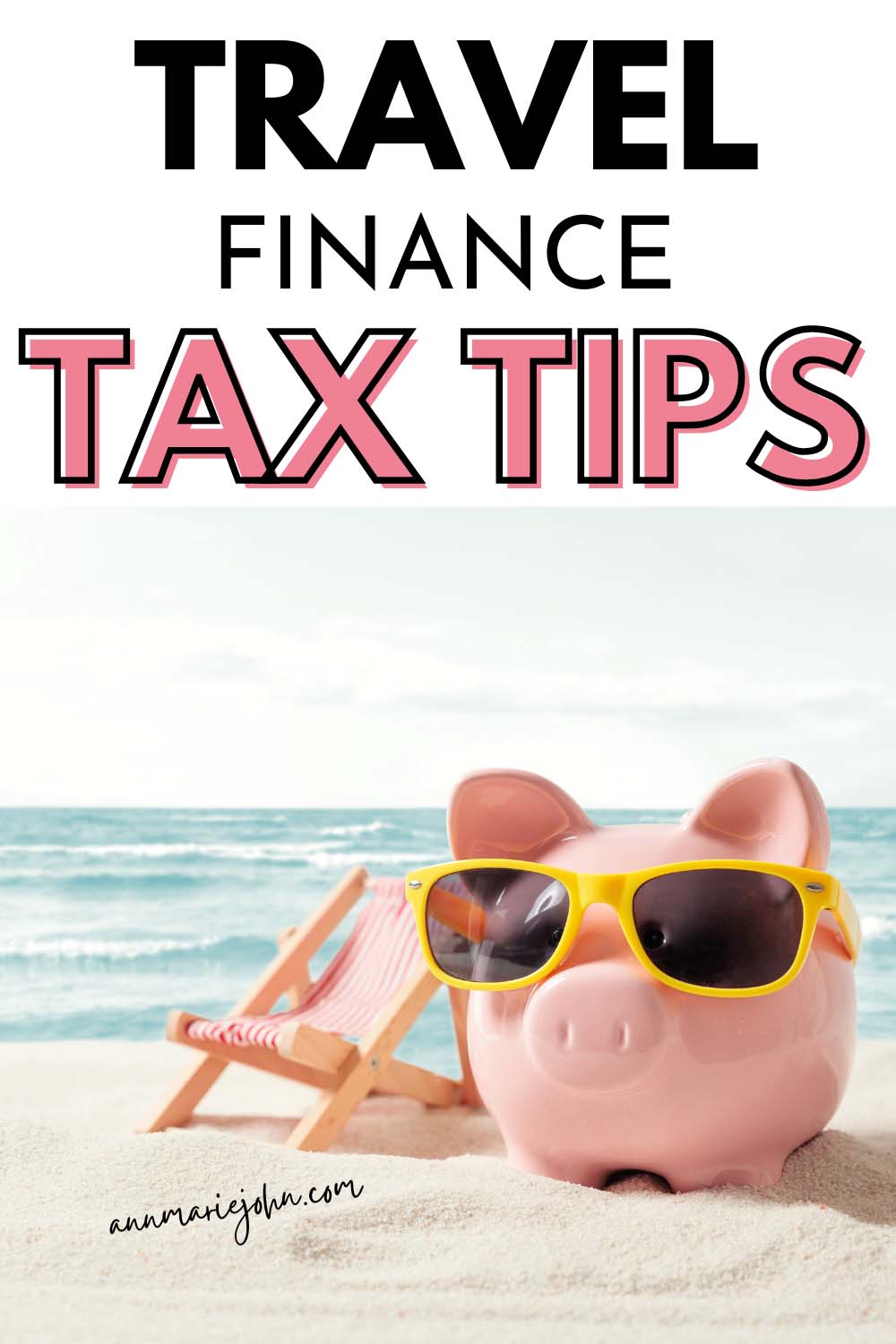Unlock a world of travel possibilities with smart tax strategies. Discover how to leverage deductions and credits to fund your adventures.

Traveling and managing your finances may seem like two distinct realms, but the savvy traveler knows there’s a powerful synergy between the two. Integrating strategic tax planning into your travel pursuits unlocks a world of possibilities, transforming your wanderlust into a financially empowered reality.
This comprehensive guide explores innovative ways to leverage tax deductions, credits, and other smart strategies to fund your travel adventures. From understanding your tax bracket’s impact on budgeting to maximizing returns through itemized deductions, you’ll discover a treasure trove of insights to help you travel more and worry less about the financial implications.

Understanding Your Tax Bracket and Its Impact on Travel Budgeting
Aligning your travel plans with sound financial strategies begins with knowing your tax bracket. This often-overlooked piece of the puzzle can significantly influence how you allocate resources for your adventures.
Did you know that the top 50% of U.S. taxpayers pay a staggering 97.7% of all income taxes? This statistic underscores the importance of comprehending your unique tax situation and how it shapes your travel budgeting.
By understanding the nuances of your tax bracket, you can make informed decisions about prioritizing travel expenses, leveraging deductions, and strategically planning for your financial future.
For residents of Nampa, Idaho, understanding local tax laws and regulations is essential for maximizing financial efficiency. By leveraging tax strategies for high income earners, individuals can potentially offset travel expenses and optimize their tax liabilities.
Moreover, considering options like personal loans in Nampa, ID, can provide additional financial flexibility to fund travel endeavors while minimizing their impact on overall financial well-being. If you’re looking for personal loans Nampa ID, Pioneer Federal Credit Union offers a variety of personal loan options to help you achieve your financial and travel goals.
Leveraging Tax Deductions and Credits for Travel-Related Expenses
When planning your travel itinerary, explore the tax deductions and credits that may apply to your trip-related expenses. The average American can save a staggering $1,000 by taking advantage of these opportunities.
For individuals seeking to optimize their tax liabilities, exploring high-income tax strategies can be instrumental. The key is to differentiate between tax deductions and tax credits. Deductions reduce your taxable income, while credits directly reduce the amount of tax you owe. Some common travel-related expenses that may qualify for deductions or credits include:
- Airfare, accommodations, and transportation
- Meals and entertainment during business trips
- Mileage for personal vehicle use during travel
- Fees for professional development or educational conferences
- Charitable donations made while traveling
Carefully documenting and claiming these travel-related expenses can actively boost your tax savings, channeling those funds directly into your next adventure.
The Role of Tax-Advantaged Accounts in Funding Your Travels
Beyond leveraging deductions and credits, savvy travelers understand the power of tax-advantaged accounts to support their wanderlust. One such account, the Health Savings Account (HSA), can be a game-changer for funding your travel plans.
HSAs allow you to contribute pre-tax dollars, which can then be withdrawn tax-free for qualified medical expenses, including those incurred while traveling. This means that contributing to an HSA can indirectly subsidize your travel costs, as the funds can be used to cover healthcare-related expenses during your trips.
Strategically allocating a portion of your travel budget to an HSA not only safeguards your financial well-being but also unlocks additional resources to fuel your globetrotting dreams.
Strategies for Maximizing Returns
When it comes to tax-efficient travel planning, the choice between taking the standard deduction or itemizing your deductions can have a significant impact on your potential savings. According to the Tax Foundation, the average itemized deduction is a staggering $30,000.
By carefully evaluating your travel-related expenses, such as transportation, accommodations, and even business-related expenses, you may find that itemizing deductions leads to a higher tax refund. This can be channeled back into your travel fund, amplifying your resources for future adventures.
Remember, base the decision between the standard deduction and itemizing on a thorough analysis of your specific financial situation and travel-related expenditures. Consulting with a tax professional helps navigate this process and ensures you’re maximizing your returns.
Comparison Table
| Feature | Standard Deduction | Itemized Deductions |
| Definition | A fixed amount that reduces your taxable income | Deductions claimed for specific eligible expenses |
| Potential Savings | Average of $12,200 (single) or $24,400 (married filing jointly) | Average of $30,000 |
| Eligibility | Available to all taxpayers | Requires detailed documentation of eligible expenses |
| Simplicity | Easier to claim, less time-consuming | More complex, and requires careful record-keeping |
| Ideal Scenario | Lower overall deductions | Higher overall deductions, especially for travel-related expenses |
Record Keeping and Documentation
Meticulous record-keeping is the foundation of successful, tax-efficient travel planning. The National Taxpayer Advocate reports that taxpayers have made an error on their income tax return due to missing or incorrect information.
Maintaining detailed records of trip-related expenses, ranging from airline tickets and hotel receipts to meal costs and transportation fees, is crucial for savvy travelers. This documentation not only helps you claim eligible deductions and credits but also ensures you’re prepared in the event of an audit.
Developing the habit of diligently logging your travel expenses not only streamlines the tax filing process but also provides valuable insights into spending patterns, empowering you to make more informed financial decisions for future trips.
A Strategy for Immediate Travel Fund Boosting
While planning for long-term travel savings is essential, sometimes you need a more immediate influx of funds to kickstart your next adventure. This is where adjusting your tax withholdings can make a significant difference.
Adjusting your withholdings, according to the Tax Policy Center, can increase your take-home pay by up to $4,000 per year. This means you’ll have access to additional funds that can be directly allocated towards your travel budget, allowing you to seize opportunities and spontaneously explore the world around you.
Carefully evaluating your withholding status and making strategic adjustments allows you to put more of your hard-earned money to work, fueling your wanderlust and creating unforgettable travel memories.
Conclusion
The fusion of travel and finance through strategic tax planning is a powerful combination that can unlock a world of adventure and financial freedom. By understanding your tax bracket, leveraging deductions and credits, and maximizing the potential of tax-advantaged accounts, you can transform your travel dreams into tangible realities.
Remember, diligent record-keeping and periodic adjustments to your withholdings further bolster your travel fund, providing the flexibility to seize spontaneous opportunities and explore the globe on your terms.
Embrace the synergy between travel and finance, and let the insights in this guide empower you to become a savvier, more financially savvy globetrotter. The world is yours to discover, and with smart tax strategies, the path to your next adventure is well within reach.
Ready to take your travel and financial plans to new heights! Explore our comprehensive guide on leveraging smart tax strategies to fund your adventures. Contact our team of travel and tax experts today to unlock the full potential of your wanderlust and financial well-being.
Frequently Asked Questions
1. What types of travel expenses are potentially tax-deductible?
While the specifics can vary based on your circumstances, some common travel-related expenses that may be tax-deductible include:
- Airfare, accommodations, and transportation for business trips
- Meals and entertainment during business-related travel
- Mileage for personal vehicle use during business-related trips
- Fees for attending professional development or educational conferences
- Charitable donations made while traveling
2. How can I ensure my travel expenses are well-documented for tax purposes?
Maintaining thorough records and documentation is crucial for claiming travel-related tax deductions and credits. By staying diligent with your record-keeping, you’ll be well-prepared to maximize your tax savings and support your travel ambitions. Some practical tips include:
- Keep receipts for all travel-related expenses, such as airfare, hotel stays, meals, and transportation.
- Log the dates, locations, and purpose of your trips, as well as the individuals involved.
- Categorize your expenses into relevant deduction or credit categories.
- Store all documentation in an organized, accessible manner, either physically or digitally.
- Consult a tax professional to ensure you’re meeting all relevant requirements.
3. Can frequent travelers benefit from specific tax credits or deductions?
Travelers who maintain a home base while extensively exploring the world may be eligible for certain tax benefits, like the foreign-earned income exclusion. Consulting a tax professional can help you identify and claim any specialized deductions or credits that may apply to your travel lifestyle. Frequent travelers may be able to take advantage of niche tax credits and deductions, such as:
- Business travel deductions for self-employed individuals or those who travel for work
- Educational travel deductions for attending conferences, workshops, or courses related to your profession
- Charitable travel deductions for volunteering or participating in service-oriented trips
